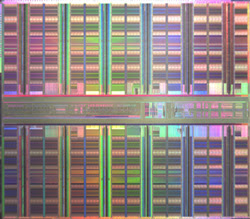An important challenge is brewing for traditional chip makers: the cloud, or Internet-based computing. Driven by the need to analyze massive amounts of data, the Goliaths of the Internet— Alphabet (aka Google), Facebook, Amazon.com, and Microsoft—are altering the very nature of computing. In the process, they are pressing at the boundaries of chip technology and forcing a major change.
* faster and smarter memory chips are needed
* 100 to 1000 times performance gains from custom hardware chips to solve particular algorithms
* current approaches to advanced AI are memory intensive
One major beneficiary could be Micron Technology. Its memory chips could play a key role in cloud chips, which will rely less on processing power than on vast amounts of memory
Once the domain of videogames and scientific computing, GPUs excel at crunching clusters of data simultaneously. Alphabet and the rest are buying them like they’re going out of style. As a result, shares of the primary supplier of GPUs, Nvidia, are up 50% in the past 12 months, although shares of another supplier, Advanced Micro Devices (AMD), have fallen sharply due to company-specific problems. If demand plays out as we foresee, it could lift the fortunes of both. They might even become takeout targets of companies such as Qualcomm and Broadcom, or the cloud giants.
Artificial intelligence is cracking language translation and advanced image recognition problems by cranking through millions of samples and determining patterns.
A Chip Remembers. One of many cutting-edge chips, Micron’s prototype “Automata” is striking for its rigid symmetry. Unlike most computer chips, its circuitry is made up of vast fields of memory, with lots of wires to connect them, and just a little bit of logic circuitry squeezed in between.
Numenta is a startup that is trying to reverse-engineer the brain’s neocortex. Using Numenta’s algorithms, models can be built tracking hundreds of thousands of data feeds simultaneously—for derivatives, currencies, and numerous other domains—as a kind of early-warning system for markets. But to do that, “we’ve got to have hardware,” says Hawkins, meaning specialized hardware that goes beyond Intel microprocessors and even GPUs.
Broadcom specializes in communications chips. Broadcom is merging with Avago Technologies in the industry’s largest-ever deal, valued at $37 billion. They are designing “dedicated processors” for the cloud-computing companies.
Two neuroscientists, Naveen Rao and Amir Khosrowshahi, run a start-up playfully called Nervana. They are designing their own chip that can analyze vast amounts of data, but they’re not looking to sell it. Instead, they’ll use it as the secret sauce to provide data analytics for a cloud-computing service.
Add smarts to Internet of Things for reality of Artificial Intelligence
Aart de Geus, who runs Synopsys (SNPS), a vendor of software programs used by virtually all chip companies to design their wares. “When you add smarts to the Internet of Things, you will have the reality of artificial intelligence,” he predicts.
That is starting to happen already to cars and flying drones and other devices with circuits customized to a task. Chip designers Mobileye (MBLY) and Ambarella (AMBA) are two good examples. Both companies start by figuring out which mathematical algorithm they are trying to solve for a given problem, such as analyzing reams and reams of video.
Says Les Kohn, Ambarella’s chief technologist: “Computer vision will be the next stage for things such as drones, where it enables the drone to pilot itself with minimal or no human intervention. For that, you need something that goes beyond a von Neumann Machine, a processor designed specifically for the algorithms of the problem at hand.”
Mobileye’s chips analyze multiple video feeds from cameras on advanced cars such as the Tesla. Their circuitry has sections devoted to rapidly “digesting” large amounts of video data about the road. “We have the ability to give the car a very deep neural-network ability, an ability to understand the entire scene on the road as you drive,” says Itay Gat, Mobileye’s head of R and D.
SOURCE – Barrons

Brian Wang is a Futurist Thought Leader and a popular Science blogger with 1 million readers per month. His blog Nextbigfuture.com is ranked #1 Science News Blog. It covers many disruptive technology and trends including Space, Robotics, Artificial Intelligence, Medicine, Anti-aging Biotechnology, and Nanotechnology.
Known for identifying cutting edge technologies, he is currently a Co-Founder of a startup and fundraiser for high potential early-stage companies. He is the Head of Research for Allocations for deep technology investments and an Angel Investor at Space Angels.
A frequent speaker at corporations, he has been a TEDx speaker, a Singularity University speaker and guest at numerous interviews for radio and podcasts. He is open to public speaking and advising engagements.



